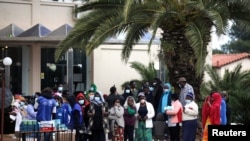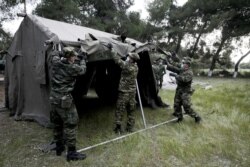The Netherlands is sending urgent medical supplies to Greece to help shield tens of thousands of migrants and refugees following a series of COVID-19 outbreaks in Greek refugee camps. The government in Athens is boosting controls there, but it is also tightening lockdown rules for migrants, stripping violators of asylum rights and slapping them with heavy fines.
Throughout the COVID crisis, Greece has been a model paradigm ... flattening its curve of infections with aggressive measures and lockdowns enforced from the start.
Now, though, days before the government in Athens moves to ease some of these controls, concerns mount over a sudden spike in cases in some of the scores of refugee camps scattered across the country.
In the southern Peloponnese region alone, about 150 migrants have tested positive at a hotel and run-down resort that has been converted into a shelter to house about 500 migrants, mainly from Cameroon and the Democratic Republic of Congo.
An aid worker and a member of the hotel's staff have also been found infected. None, though, have shown serious symptoms so far.
Still, the outbreak at the hotel camp follows two others recorded in different migrant establishments this week. This, after migrants claimed they were being neglected and left uninformed throughout this health crisis, sparked protests, with demonstrators setting fire to a refugee camp on the island of Chios after a young Iraqi asylum seeker died from what appeared to the coronavirus.
With tensions brewing at the camps, many migrants have been caught sneaking out of the squalid and overcrowded establishments, trying to find refuge elsewhere – a move that poses a huge health risks and may compromise Greece's success in controlling the pandemic.
With the country hosting more than 100,000 refugees in 93 camps across the country, though, the government is scrambling to contain the camp infections, fearing the camps may turn into dangerous flashpoints.
Migration and Asylum Minister Notis Mitarachi said he'll think twice about easing lockdown controls at these facilities before the end of next month.
Until then, though, he said, migrants caught violating quarantines will be barred from applying for asylum. They will also face stiff fines and be deported back to their homelands or neighboring Turkey.
Human rights advocates have already cast a critical eye at the decision, and it remains unclear how authorities will press ahead with forced returns as countries like Turkey have closed their borders to contain the spread of the coronavirus.
Facing the prospect of coping for years with a migrant crisis that is far from abating, Mitarachi said Greece wants the EU to step in and organize the deportations.
He said Greece alone can no longer shoulder the burden of Europe's lingering refugee crisis.





